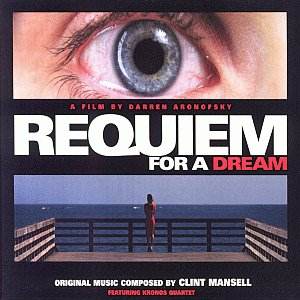Director Darren Aronofsky follows up the movie Pi by re-enlisting
Mansell's aid in carving a unique dreamscape. The electronica for that last
collaboration ensured a powerfully lingering aural impression (or 'headache'
for short) that was totally appropriate for the subject matter. What we have
here stems from the same school of electronic sampling and manipulation,
but is for the most part, something that leaves a feeling of through-scored
unity.
Divided into 3 sections ("Summer", "Fall", and "Winter"), there are very
definite dividing lines. "Summer Overture" introduces the score's impressive
main theme; a sawing back and forth performance from Kronos Quartet which
misleads the ear for what follows. The sampling and sound effect are a let
down after the melodic opening, but once you arrive at the first Conga ("Bialy
& Lox Conga") which closes the "Summer" section, you'll never be quite
sure what's coming next.
"Fall" begins with a version of the main theme that repeats itself into fade-out.
Later in "Marion Barfs" we hear the theme's counterpoint pushed forward and
prolonged. Interspersed are yet more taste testing examples of sampled effect
(e.g. "Sara Goldfarb Has Left the Building"), before we finish on the even
more manic "Bugs Got a Devilish Grin Conga".
"Winter" is the real evidence for a through-scored approach with a new motif
introduced infectiously in "Southern Hospitality". It's a use of sampled
strings that incessant builds and builds with its digging and clawing.
Unfortunately, despite the feeling of an intellectual process, the piece
becomes more and more unpalatable as it is tweaked to higher pitch in "Fear",
interrupted by tinkling keyboard in "The Beginning of the End", and is then
pitched to insane levels in "Meltdown".
Like Howard Shore's The Cell, this is a highly experimental approach
to scoring the interpretive arena of dreams. Away from the screen, it takes
some passionate appreciation for what it does to the film to make for an
enjoyable repeat standalone experience.
Paul Tonks





